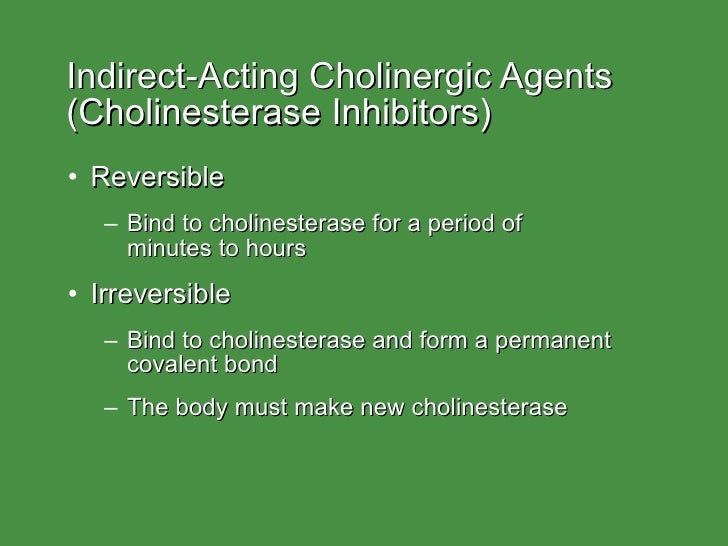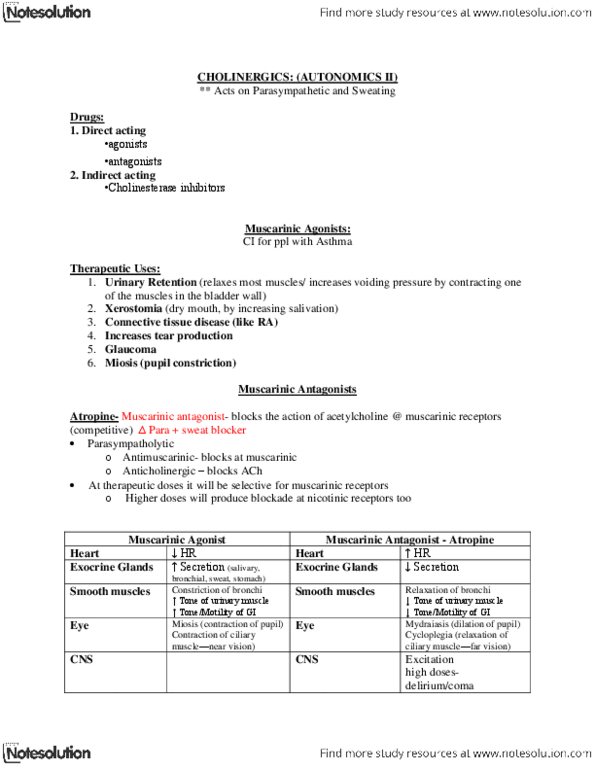They can enter the human body through skin absorption inhalation and ingestion. The main use of cholinesterase inhibitors is for the treatment of dementia in patients with alzheimers disease.

Cholinergic Blockers
Print Pharmacology Cholinergic Antagonists Flashcards Easy Notecards

Cholinoceptor Activating Cholinesterase Inhibiting Drugs 2014
In biochemistry a cholinesterase or choline esterase is an esterase that lyses choline based esters several of which serve as neurotransmitters.

Cholinesterase blocker. As such cholinesterase inhibitors block the metabolism of acetylcholine. The use of cholinesterase inhibitors is only one possible pharmaceutical approach to treating the symptoms of alzheimers disease. Cholinomimetic drugs cholinergic agonists cholinesterase inhibitors.
Some common side effects or adverse events of cholinesterase inhibitors are. Acetylcholinesterase inhibitors which for brevity we will refer to as cholinesterase inhibitors are chemicals whose primary toxic effect is to block the normal breakdown of the neurotransmitter acetylcholine. Answer this drug may be prescribed for alzheimers disease that isnt too severe yet as well as other types.
People with alzheimers disease have reduced levels of acetylcholine in the brain. This normal breakdown is shown in figure 1 below. Thus it is either of two enzymes that catalyze the hydrolysis of these cholinergic neurotransmitters such as breaking acetylcholine into choline and acetic acid.
Cholinesterase is a family of enzymes that catalyzes the hydrolysis of the neurotransmitter acetylcholine ach into choline and acetic acid a reaction necessary to allow a cholinergic neuron to return to its resting state after activation. Cholinesterase inhibitors effectively increase the concentration of acetylcholine at all cholinergic synapses. Breakdown of acetylcholine by cholinesterase optional reading figure 1.
Cholinesterase inhibitors have been shown to have a modest effect on dementia symptoms such as cognition. Cholinesterase inhibitors result in higher concentrations of acetylcholine leading to increased communication between nerve cells which in turn may temporarily improve or stabilise the symptoms of dementia. Organophosphate insecticides include some of the most toxic pesticides.
What are side effects of cholinesterase inhibitors for the treatment of dementia. The cholinesterase inhibitors increase the activity of cholinergic neurons by blocking the enzyme acetylcholinesterase which metabolizes or breaks down acetylcholine. An acetylcholinesterase inhibitor often abbreviated achei or anti cholinesterase is a chemical or a drug that inhibits the acetylcholinesterase enzyme from breaking down acetylcholine thereby increasing both the level and duration of action of the neurotransmitter acetylcholine.
They can affect cholinesterase activity in both red blood cells and in blood plasma and can act directly or in combination with other enzymes.

Anticholinesterases And Anticholinergic Drugs Sciencedirect

Dual Acetylcholinesterase Inhibitors And Nmda Receptor Blocker

Nurs 2050 Lecture Notes Fall 2012 Beta Blocker

EmoticonEmoticon